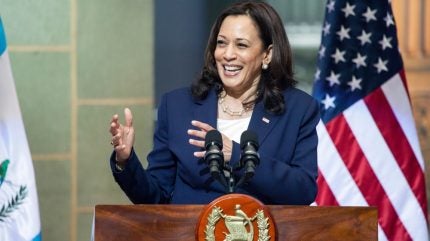
Last week, the US presidential race took an unexpected turn when President Joe Biden announced he was no longer seeking re-election.
In a letter posted to social media as he recovered from Covid, Biden said he believed it was “in the best interests of [the] party and the country” to step aside and focus on his remaining duties as president.
Biden endorsed vice president Kamala Harris as his successor in a move that caught many off guard and instantly transformed the Democratic fight for presidency and upended expectations of a 2020 rematch between Biden and Donald Trump.
Harris quickly stated her intention to “unite our party and our nation, and defeat Donald Trump.”
The sudden change in US politics has raised questions in the last week about potential policy shifts, particularly in areas affecting the retail industry and apparel supply chain.

US Tariffs are shifting - will you react or anticipate?
Don’t let policy changes catch you off guard. Stay proactive with real-time data and expert analysis.
By GlobalDataGlobalData retail analyst Neil Saunders previously told Just Style that while there may not be an immediate impact on the apparel sector, Harris’s nomination could lead to some changes in policies if she secures the presidency.
This uncertainty is compounded by the looming spectre of a possible Trump comeback, with professor of fashion and apparel studies at the University of Delaware, Dr. Sheng Lu, warning that the “Grand Old Party (Republican Party)” could significantly shake up fashion companies’ operations and supply chains.
Bob Antoshak, partner at Gherzi Textil Organization, noted that Harris’s previous record under the Biden administration, particularly her work on the Partnership for Central America (CTP), might offer insights into her priorities. The CTP focused on regional investment and job creation in the Caribbean, with a particular emphasis on the apparel industry.
But amidst the swirling speculation, it’s crucial to maintain perspective.
Saunders reminded us in a LinkedIn post yesterday (28 July) that historically, elections themselves have a relatively modest impact on retail performance.
“It is hard to tie all of this directly to an election, but it is certainly the case that consumers get more distracted, and some get more nervous about the election as it approaches,” he said.
The real game-changer, he argued, lies in the policies implemented after the inauguration. With major issues like the expiration of the Tax Cuts and Jobs Act and potential shifts in trade relations with China on the horizon, the stakes for retail couldn’t be higher.
As the US grapples with the possibility of a new Harris administration or a Trump return, it also faces additional scrutiny over its technological partnerships and data security practices, especially following the worldwide IT failure on 19 July.
Floating in the background of all this is ongoing concerns surrounding China.
Senator Tom Cotton has challenged the Biden administration to prevent Shein from selling so-called “potentially fraudulent supply-chain technology to US companies” based on his claims the Singapore-headquartered fast fashion giant has ties to the Chinese Communist Party (CCP).
Shein told Just Style at the time it is not selling software to third parties – instead, it was using its expertise to increase efficiency and limit waste and was keen to add that its data security policies and practices were in line with industry standards.
As the election date draws closer, the apparel supply chain and wider retail industry will be watching intently to see how vice president Harris’s various policy positions develop and what impact they could have on apparel and retail moving forward.
Meanwhile the fashion sector and consumers alike are wise to remember the decisions they make in the voting booth will reverberate through cash registers across the nation for years to come.
Top stories on Just Style this week…
Nike slammed for supply chain ‘human rights crisis’
A coalition of worker rights campaigners have criticised Nike’s “inaction” over an alleged human rights crisis in its supply chain.
US senator accuses Shein of selling ‘fraudulent’ supply chain tech
US senator Tom Cotton has asked Biden’s administration to prevent Shein from selling so-called “potentially fraudulent supply-chain technology to US companies,” but Shein tells Just Style it is not selling software to third parties – instead it is using its expertise to increase efficiency and limit waste.
Explainer: Impact of progressive trade policy on US imports from China
The US government is being urged to adopt progressive apparel trade policies that are both offensive and defensive to boost domestic manufacturing and US jobs while cracking down on duty-free loopholes.
Explainer: How vulnerable is the apparel industry to technology failures
Following what is being dubbed the “world’s biggest IT failure,” Just Style investigates how it impacted the global apparel supply chain and what the industry can do to make itself more resilient to technology-related issues in future.
Explainer: What next for apparel as odds-on Harris will succeed Biden in US election
Just Style investigates what US President Joe Biden exiting the US election race and vice president Kamala Harris attracting the support of Democratic delegates as his replacement means for the apparel industry.
Lululemon urged to commit to clean energy amid greenwashing lawsuit
Several Olympic athletes have signed a joint letter to the CEO of Canadian sports brand Lululemon urging him to commit to clean energy a week after a consumer submitted a class action lawsuit against the retailer’s alleged “misleading’ Be Planet campaign.
Bangladesh garment factories fear unrest has weakened buyer confidence
Bangladesh apparel industry leaders are concerned Bangladesh’s recent unrest and garment factory closures could undermine the country’s reputation for being a reliable global apparel sourcing destination.
Unsold footwear, textiles destruction to be banned under new EU law
New EU regulation is underway to ban the destruction of unsold textiles and footwear as part of wider plans to make products sold on the EU market more sustainable.



